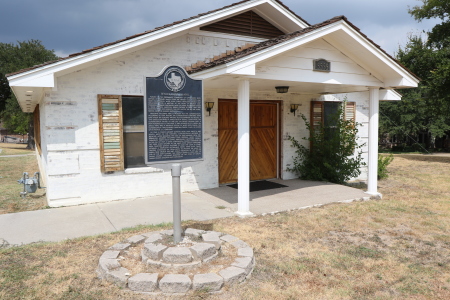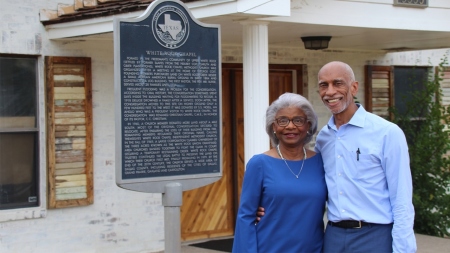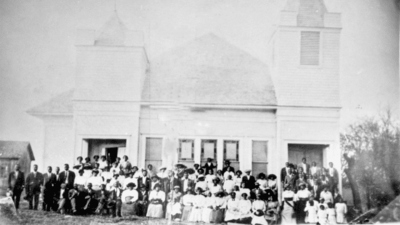Texas city council approves historic black church's zoning permit after legal pushback

A Texas city council unanimously voted to approve a zoning application for a historic black church following a years-long legal battle.
Attorneys for White Rock Chapel in Addison, just north of Dallas, are hailing the Monday vote as a victory after the church struggled to obtain the permit they first applied for two years ago, according to a press release from the nonprofit First Liberty Institute.
Five years ago, Don and Wanda Wesson purchased the church property with the intention of preserving it and opening it up for community Bible studies and other events. In 2018, it was designated "as a private, nonprofit cultural and spiritual convening place with the 501(c)(3) designation," according to the chapel's website.
Founded by freed slaves in 1844, White Rock Chapel has gone through multiple iterations throughout its long history. After flash flooding destroyed the original structure in 1918, wealthy landowner Sidney Smith Noell donated two acres to the congregation on higher ground and often worshiped with them.

Storms and suspected arson caused further damage in later years, with the current building being dedicated in 1981. The Texas Historical Commission designated the church's location as a historic site with a Texas State Historical Marker in 2000.
When he applied for the requisite special use permits to renovate the facility, however, Wesson said he was met with pushback from some in the upscale neighborhood.
"When we went to get a permit to do the remodeling of the chapel to make it available for church services and Bible study, the neighborhood opposition came alive," Wesson said in a September video explaining the situation.
Despite seven meetings with neighborhood leaders and the approval of the city's planning and zoning commission, enough residents adjacent to the property filed a written complaint to require a super-majority of six out of seven city council votes for Wesson to obtain the permit.
The vote failed by two.
Lawyers with First Liberty Institute and McDermott Will and Emery LLP subsequently got involved, firing off a demand letter to city leadership in September, accusing them of violating the church's "right to religious exercise" by not issuing the permit.
“Because the Council denied White Rock Chapel’s Permit, it barred any possibility for White Rock Chapel to function and exist," the demand letter read. "Such a deliberate prohibition is in direct violation of state and federal law and constitutionally protected freedoms. The Council must immediately approve of a Permit that will allow White Rock Chapel to engage in religious and educational activities.”

Ryan Gardner, an attorney with First Liberty who worked on the case, told The Christian Post that "it's tough to say for sure" why the city council switched course this week and approved the permit. He said he hopes they came to realize "the value that this church is going to bring to their community, how this history of this place needs to be preserved."
He also noted the city leadership "were reminded there's a law higher than their zoning ordinances in some cases, and they were also reminded that even if you face intense opposition from others, that the Constitution does not allow for a heckler's veto to exclude religious people from exercising their religion freely."
Gardner also said that even though the Wessons acted in good faith, they were faced with hostility "every step of the way."
Attorney Jeremy Dys, also of First Liberty Institute, suggested to Fox News Digital in September that the neighbor complaints emerged from antipathy to having a "small African American congregation" in their wealthy neighborhood.
Gardner echoed Dys, telling CP there was "nothing White Rock Chapel could say or do to get these people on their side, to help them see that preserving and continuing the long legacy of this church was going to help them."
Gardner said he is "astounded" at the backstory of White Rock Chapel, which he noted remains one of reconciliation.
"It's the best story of reconciliation of these enslaved men and women, who worked so long just to have this church," he said. "Then they acquired the property from their former enslaver, who then attended worship services with them. I've never heard of anything like that before."
"It's really been great to help the Wessons in spreading that story and, in this instance, we're thrilled that the city of Addison did the right thing," he added.
A spokesperson for the city of Addison said in a statement provided to CP: "Following a comprehensive review and careful consideration, the Addison City Council unanimously approved the White Rock Chapel’s Special Use Permit request at a special Public Hearing. The Town looks forward to working closely with the Wessons as they proceed with the restoration of this historical site."
Jon Brown is a reporter for The Christian Post. Send news tips to jon.brown@christianpost.com





















